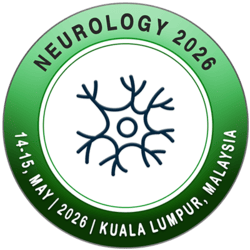Track: Parkinson's Disease
.jpg)
Session Overview:
Parkinson's Disease (PD) is a chronic and progressive neurodegenerative disorder, marked by the deterioration of motor functions and a range of non-motor symptoms, affecting millions globally. This session is designed to provide a comprehensive exploration of the latest research advancements and innovative treatment strategies, shedding light on the multifaceted nature of PD. Attendees will gain insights into the genetic and environmental risk factors that contribute to the onset and progression of the disease, with a special focus on the role of neuroinflammation and mitochondrial dysfunction. The session will also highlight cutting-edge developments in biomarkers and diagnostic tools, paving the way for earlier and more accurate detection of PD. By integrating discussions on neuroprotective therapies, deep brain stimulation, and patient-centered care approaches, this session aims to chart future directions in Parkinson's Disease management, fostering interdisciplinary collaboration and inspiring new research avenues to improve patient outcomes.
Recent Development:
Recent advancements in Parkinson's Disease (PD) research have revolutionized the understanding and treatment of the disorder. Cutting-edge discoveries in genetics and neuroinflammation have identified novel targets for potential therapies, while advanced imaging techniques and biomarkers are enhancing early diagnosis. Innovations in neuroprotective drugs aim to slow disease progression, with several promising candidates in clinical trials. Deep Brain Stimulation (DBS) has seen enhancements through robotic assistance, providing more precise electrode placement, thereby improving symptom management. Artificial Intelligence (AI) and Machine Learning (ML) are increasingly being utilized to analyze vast datasets, predicting disease progression, optimizing treatment plans, and personalizing therapies. AI-driven algorithms are also being used to detect subtle changes in speech and movement, offering non-invasive early detection methods. Furthermore, wearable devices and sensors, integrated with AI, are enabling continuous monitoring of symptoms, providing real-time feedback for both patients and healthcare providers. These advancements are paving the way for more effective, personalized, and proactive management of Parkinson's Disease.
Sub-Tracks:
Molecular Mechanisms
Examines the cellular and molecular processes, including alpha-synuclein aggregation and mitochondrial dysfunction, underlying Parkinson's Disease.
Genetics and EpigeneticsFocuses on the genetic mutations and epigenetic changes that contribute to disease susceptibility and progression.
Biomarkers and Diagnostics
Explores advanced biomarkers and imaging techniques for early and accurate diagnosis of Parkinson's Disease.
Neuroinflammation and Immune Response
Investigates the role of neuroinflammation and the immune system in Parkinson's pathogenesis.
Neuroprotective Strategies
Discusses therapeutic approaches aimed at protecting neurons and slowing disease progression.
Motor Symptom Management
Covers traditional and novel therapies for controlling motor symptoms like tremors, rigidity, and bradykinesia.
Non-Motor Symptoms
Addresses the management of non-motor symptoms, including cognitive decline, sleep disorders, and depression.
Deep Brain Stimulation (DBS) and Neuromodulation
Explores the use of DBS and other neuromodulation techniques to alleviate symptoms.
Rehabilitation and Physical Therapy
Focuses on exercise and rehabilitation strategies to improve quality of life and maintain physical function.
Future Therapies and Clinical Trials
Highlights emerging treatments, such as gene therapy, stem cell therapy, and ongoing clinical trials aiming to alter the course of the disease.
Scientific Highlights
- Neurology
- Neuro Anatomy
- Mental Health and Psychiatry
- Geriatric Neurological Disorders
- Neuromuscular Diseases
- Brain Tumor and Neuro-oncology
- Cerebrovascular and Critical Care Neurology
- Clinical Neurophysiology
- Central Nervous System
- Neuro-Ophthalmology
- Pediatric Neurology
- Neuroimaging and Brain Mapping
- Neurogenetics and Neurodegenerative Disease
- Behavioral and Cognitive Neuroscience
- Neurochemistry and Neuropharmacology
- Spinal Neurosurgery and Neural Transplantation
- Neuro Robotics and Neuro Modulators
- Addiction and Adult Psychology
- Brain Stimulation and Computational Neuroscience
- Neural Control of Micturition
- Parkinson's Disease


